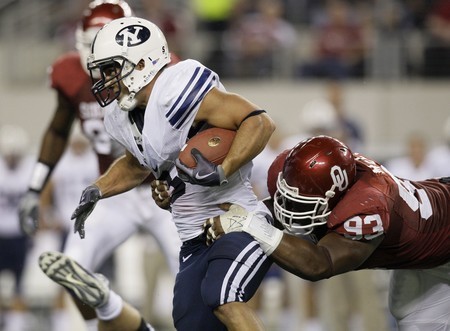College football polls all about (mis)perceptions

It doesn’t matter which voter from The Associated Press Top 25 college football poll said it. The message is far more important, because it again cuts to a reality of how many continue to buy into that cartel known as Bowl Championship Series.
It’s a mindset thing.
And it’s wrong.
The voter in question on Tuesday explained parts of his weekly ballot, specifically where he placed Brigham Young and Oklahoma after the Cougars’ 14-13 victory Saturday.
BYU entered the game ranked No. 20; Oklahoma was No. 3.
Once the Cougars again proved Bob Stoops is worth all that money when he is coaching meaningless games against the Idaho States of the world, BYU rose to No. 9 in the rankings and the Sooners landed at No. 13.
But here was a national voter on a national network, trying to justify why on his ballot, BYU was No. 13 and the Sooners No. 10.
His reasoning: BYU had not appeared on his preseason ballot, while the Sooners were No. 3. He found it difficult to raise the Cougars to a Top-10 level while dropping an Oklahoma team that lost quarterback Sam Bradford to injury any lower.
The real kicker: “There are so many ways to look at it,” the voter said. “How much does one team deserve to rise and how much does one team deserve to fall? There is no question that if this was the final poll and my poll was part of the BCS system, I would have much more seriously considered putting BYU ahead of Oklahoma because of the head-to-head victory.
“But because it’s only Week 2, I’m not apt to do that.”
You have just read that which defines everything wrong with these polls.
First, there is only one way to look at it. BYU beat Oklahoma in a season’s first week, which represents all the evidence we have on either team. BYU should be ranked higher, and yet the fact it is somewhat stunned me when the poll was released Tuesday for this reason:
Many voters find ways to justify even the most foolish decisions when it comes to weighing the merits of BCS teams against a non-BCS one. We’ve seen it for years. Instead of making decisions when voting weekly, many can’t abandon their pre-determined adoration for BCS teams.
Second, if there was ever a time to base decisions on head-to-head games, it’s now and not at season’s end, given this is the only time we have seen either team in 2009.
This just in: The score of Saturday’s game isn’t changing. Today. Two weeks from now. End of the season. Oklahoma isn’t winning that game. If you would vote BYU higher because of it in three months, why not now? And what does being part of the BCS system have to do with voting correctly?
One voter’s weak excuse for not doing the right thing isn’t all that significant. In fact, given the Cougars jumped ahead of the Sooners this week, more voters than not offered fair ballots on the point.
The Associated Press poll isn’t used in the BCS formula to determine which teams play for the national championship, because at some point those at AP became worried about things such as, well, their integrity when linked to such an inequitable system.
(The coach’s poll, though, remains part of the formula, meaning the feeble cowards who vote in it and again are refusing to make their final ballots public still own a say in which teams play for the title.)
More than anything, though, this continues to be about perception. From the BCS. From fans. From the media, the print and Internet and TV side of things.
It’s a battle the Mountain West Conference and other non-BCS leagues constantly fight and might never win. They had no choice but to sign the new BCS contract in July, one that means at least four more years of a system that unfairly bestows automatic bids to just six leagues.
They had no choice because they couldn’t rob from member schools the potential for such financial gain and exposure a BCS game brings.
It’s true football polls before October are useless. They’re fun to debate. To write about. But they mean little. Perception does, however. Mindsets are really difficult to change.
Take a Heisman Trophy watch on ESPN.com this week. Again, it means nothing this early. But of the 15 experts who participated (many of whom own Heisman votes), nine placed Florida quarterback Tim Tebow first and Texas quarterback Colt McCoy second.
Tebow, who played less than a half of a 62-3 win against Charleston Southern.
McCoy, whose team routed Louisiana-Monroe 59-20.
Wouldn’t you think if voters are doing what they should — to cast their ballot for the award based on the available evidence for 2009 and not on past accomplishments — that BYU quarterback Max Hall should have received more than zero first- or second-place votes? Tebow totaled 69 points; Hall totaled 10.
After the first week of results.
Then again, this is a Heisman update where Bradford actually received a fifth-place vote after being injured against BYU.
Perceptions. Mindsets.
Man, they really make a great game frustrating to watch sometimes.
A lot of this means nothing after one week.
In the big picture that is college football, it means everything.
Las Vegas Review-Journal sports columnist Ed Graney can be reached at egraney@reviewjournal.com or 702-383-4618. He also can be heard weeknights from 11 p.m. to 1 a.m. on “The Sports Scribes” on KDWN (720 AM) and www.infernosportsradio.com.












